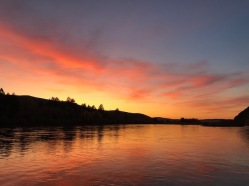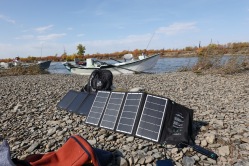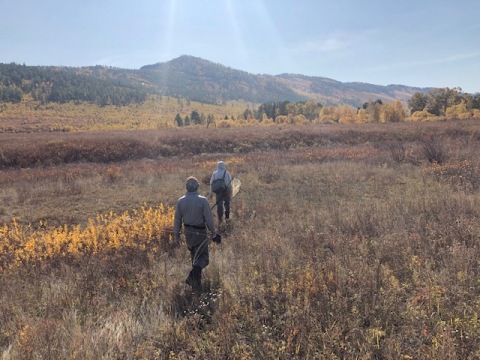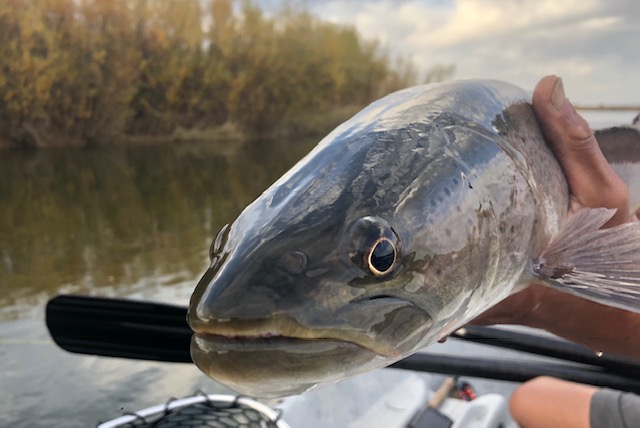
“You are fishing where?” asked an incredulous friend. “What on earth for?” It was a typical remark. Even from some fishing friends. And there were, as always, two answers.
- Wild fish don’t live in ugliness. They live in beautiful places. I want to see more beauty in my dwindling days.
- Taimen, a landlocked salmon, are found in Mongolia and parts of Russia. It’s a fierce and aggressive creature and lives by eating other fish. There are also Pike, the Amur trout and the Lenok, a local fish, all of which will come (or not) to a fly.
The idea to fish Mongolia came from a friend and guide, Marcelo Poo, who I met in Chile at the Estancia de los Rios (https://www.estanciadelosrios.com/videos) in Chilean Patagonia a couple of years back. He guides in Mongolia for Mongolia River Outfitters (MRO) when he’s not working in Chile. He said it was even more wild than Patagonia. So I flew to Ulan Bator and landed at Chingis Khan airport. That’s how Mongolians pronounce the name of the great Mongol marauder, with a Ch where others use a G. I got there via Istanbul but South Korea is also a useful hub for flights in. What greeted me was a fairly typical post-Soviet city of featureless apartment blocks interspersed with advertisements for all the usual globalisation bling (BMW, Samsung, Rolex, Johnny Walker, etc) that have accompanied shucking off Chinese rule in 1921 with Soviet help and then walking away from Soviet influence in the 1990s.
Chingis Khan might have been horrified to see what his name has been attached to. Restaurants, souvenir shops, bars. But the Grand Khaan Irish pub does a nice line in Mongolian dumplings, soups and grills as well as the usual burgernchips. The people could have been in any European city, apart from a few wearing the traditional Mongolian calf-length tunic or Deel, the bright colours reminding you that China is to the South. Then there are the grid-like streets and imposing official buildings, reminding you that Russia is to the North. But the temples, especially the Bogd Khan palace, a vast old temple in the city centre – Ulan Bator means Red Hero after the Buddhists’ red robes – say you are in Mongolia.
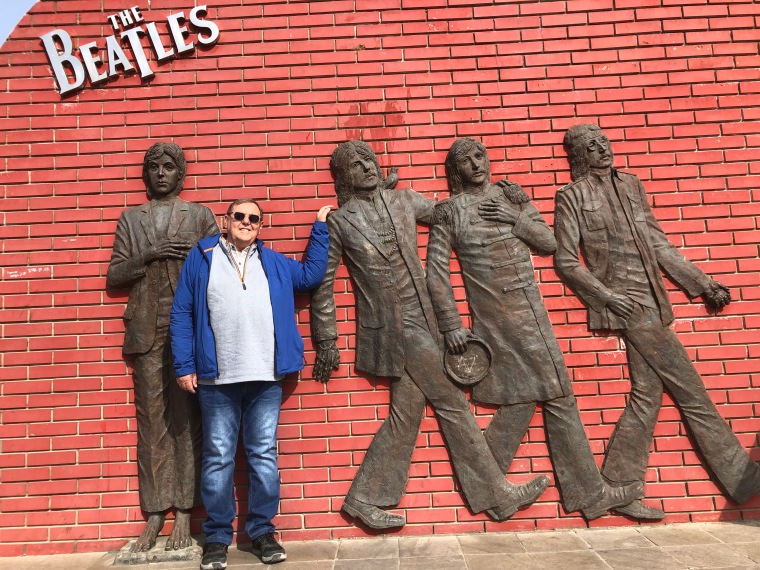 And the Beatles statue. When Mongolia was in Soviet Russia’s orbit, the Beatles were revolutionary music and frowned upon. Now that Mongolia is fully independent, the Fab Four statue is a go-to place on a little city centre square on which sits, helpfully, a fairly well-stocked fishing tackle shop. It’s a popular place for wedding photos.
And the Beatles statue. When Mongolia was in Soviet Russia’s orbit, the Beatles were revolutionary music and frowned upon. Now that Mongolia is fully independent, the Fab Four statue is a go-to place on a little city centre square on which sits, helpfully, a fairly well-stocked fishing tackle shop. It’s a popular place for wedding photos.
I was the only fisherman on our small aircraft flying north to the Onon river. All the other passengers worked for MRO. A bumpy drive later and we were by the river, which Marcelo had warned me was uncommonly high, which is not good for fishing anything. There I teamed up with anglers who had already fished the upper stretch of the river for a week. They were somewhat disconsolate about the lack of Taimen so far but were promised the next few days would change their luck. I got into waders and jacket and boarded Marcelo’s boat to drift downstream. He warned me that when you hook a Taimen you don’t lift your rod tip, which you do for fishing trout. Instead you “strip strike”, which means maintaining the rod low and pulling the line sharply several times to try to embed the hook in the fish’s rock-hard mouth. The water was coloured and high and not encouraging. The other anglers disappeared into the distance while the “camp followers”, staff in inflatable boats, took the entire camp, tent, shower, toilets, kitchen and everything else, down to our next camp site several hours downstream. This happened every day. One minute you’d be eating scrambled eggs in the restaurant tent and the next minute it would be on an inflatable piled high with bags floating downstream. It was a bit Lewis and Clark or maybe Livingstone, but it was efficient, ran like railways used to and made sure there was a dry bed and warm food and company every night. Easy to take for granted when you are not the one digging the next latrine or preparing dinner for eight on an open fire.
Within minutes Marcelo and I were alone on a broad sweep of river flanked by canyons on one side and plains on the other. Half Montana, half Wyoming, all Mongolia, the most sparsely populated country in the world but the 18th largest, with a population of three million. In a week I saw three other people and one car. The fly Marcelo gave me was heavy, to sink in the high water, and garish. It resembled a road-killed Peacock and was as easy to cast as a piano stool. Accustomed to casting more genteel creations, my shoulders began to ache, and we switched to a popper or gurgler. These are also extravagant creations which float on the surface and make a lot of splash and noise on retrieval; this annoys the aggressive Taimen no end. We tried a lot of likely spots and made a great deal of surface noise but nothing moved. I was about to suggest we change back to a weighted chicken when a Taimen zipped into the air like a missile with my gurgler in its teeth. I stripped, I struck, several times. And it stayed on long enough to be netted. It was just a small one, maybe 18 inches. But when Marcelo opened its jaws the fly just popped out. It wasn’t even hooked.
I learned the lesson very quickly. Taimen make playground bullies with stolen footballs seem positively meek and mild. For them possession is 9.5 tenths of the law. Often they will not open their mouths when “hooked” because they don’t want to give up what they have taken. In the strictest sense of the word, MANY are not hooked at all.
Other boats and anglers drifted by as this happened. “Fish on your first day huh?” said one American voice. “Nobody is gonna talk to you this week. I hope you know that.” He was joking. The nightly banter around the dinner table as well as serious discussion of the habitat was an unforgettable feature.

In my experience a first day fish is never a good thing. It encourages the feeling that every day will bring more of the same rewards. Unless you’ve caught a first day fish and been skunked for the rest of the week, which was my Mongolian experience in a nutshell. I connected with many more, including big ones, but just couldn’t get them to the boat. Which didn’t upset me at all. That evening, in the company of six other anglers, we swapped notes and few were taking fish at all. Over a week it seemed that one boat would catch several and others nothing. The pictures I include here are of the lucky anglers who did. It was a total camping adventure, although the food and accommodation tended towards the glamping side. There was no electricity, no mobile phone coverage, no Internet. Just the sounds of water moving through wilderness. To keep camera batteries charged, I bought a solar panel with me and the only lighting in our tents was from solar-powered lamps that had fired up on boats during the day.
And they were great people. The banter was hard-edged but benign. We spent our evenings in the restaurant tent eating good food, imported vegetables and local treats. Then it would be a brisk walk in freezing temperatures back to the tent and under the many blankets as fast as possible and deep sleep. The morning light woke me up but what ultimately made me shed my blankets was the daily arrival of Tukol, a diminutive Mongolian mother of three who brought us all fresh coffee, a piece of Snickers/Marathon and a biscuit every morning. She would stoop inside the tent door, deposit a cup of coffee and a plate of goodies and say, “you are welcome” when thanked. Every day.
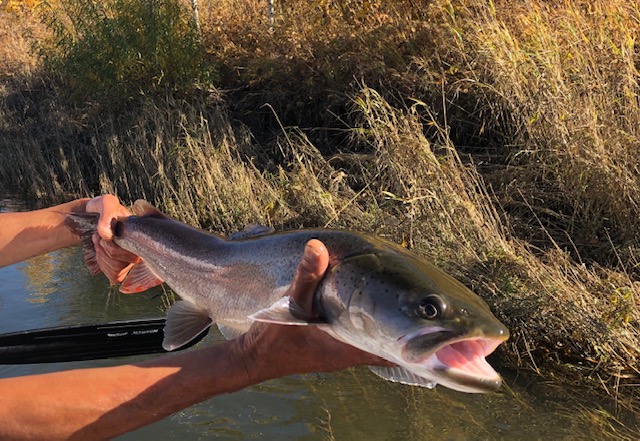
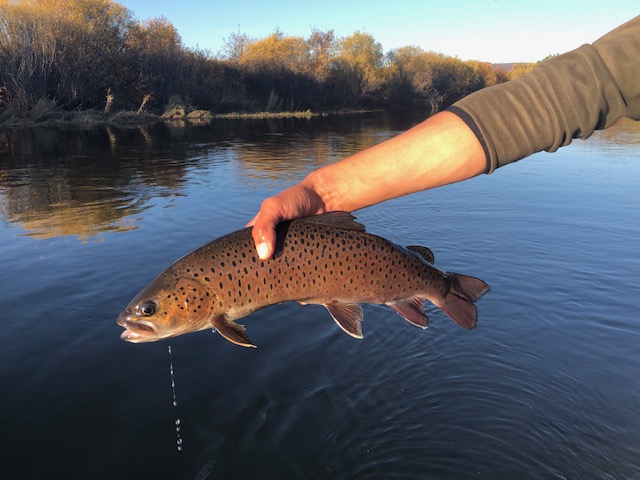
After breakfast it would be back to the boats to drift downstream while the camp was packed, except for the lunch raft, which set up a barbecue and table half way down the river so we could eat pork chops with fresh apples and sautéed potatoes bankside. In all we drifted about 100 miles downstream to the last campsite, which was a permanent fixture and lodged us in traditional Mongolian Gers, round huts made of felt and decorated on the inside the Mongolian way.
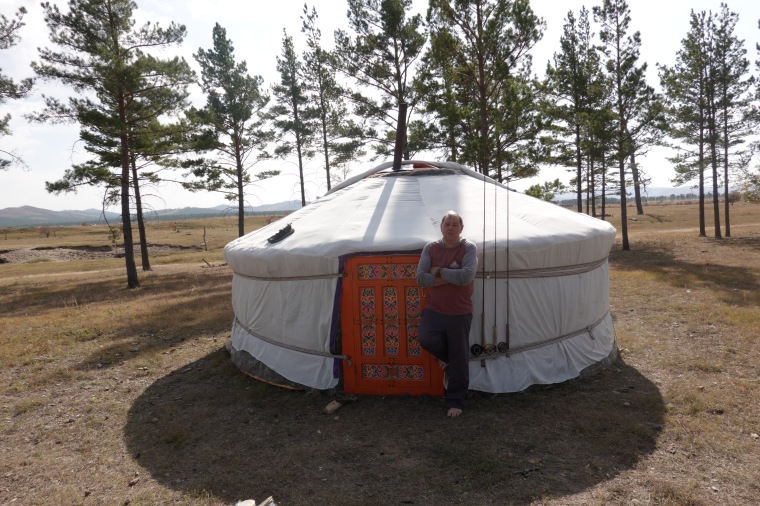
The days were hot, sometimes very hot, and the fishing was hard. In one spot off the main river, head guide Peter Fong said bluntly: “I know the Taimen are here.” I cast. A Taimen grabbed my fly, leaped in the air and was gone. Then another did the same thing, then another. Meanwhile my partner in the boat, Merrill, landed two big ones. So goes fishing. They say Taimen are the fish of a thousand casts. I think that may underestimate it a bit. If Taimen are the bully boys of the river, then Pike are the outright thugs. I caught one by mistake but it was a thrilling error. All my fishing life guides have told me “keep pulling him back, your rod can take it.” Until Jack, my guide, that day said, “whoah, let out a bit of line or you will snap the rod.” It was then I noticed it had gone U-shaped under a battling Pike.
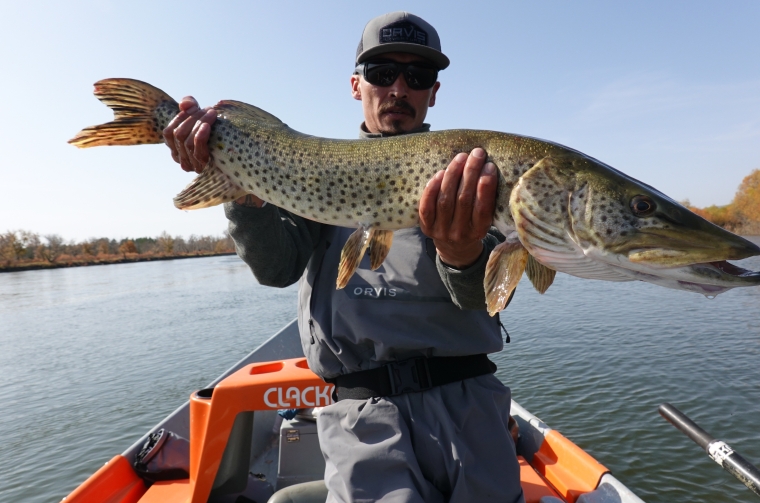
On the last day Jack and I were alone in the boat and fished for Pike exclusively, looking for slack water where the fish would like to ambush prey. He tied on a wire trace against the toothsome greeting of a pike, and lures that resembled small fish.
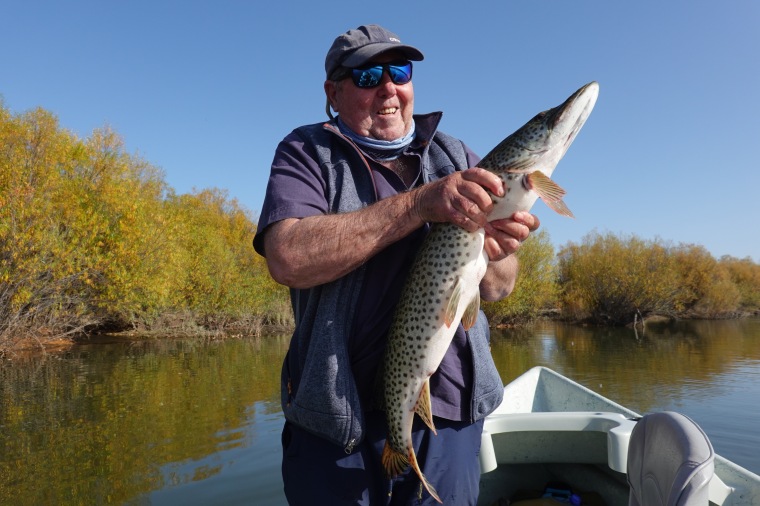
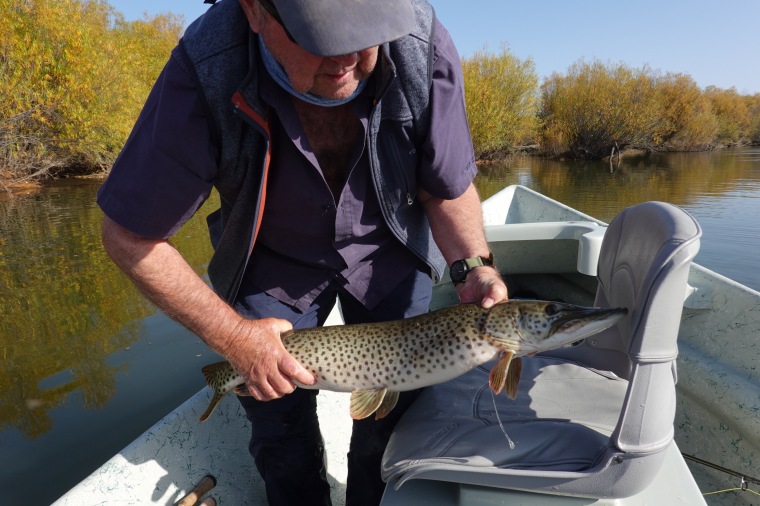
My notebook is not clear how many we caught but they were many, all of them around an arm’s length or more and as savage as gut-shot bears. One took the hook so deep that we had to wedge its jaws open with the sunscreen bottle. Putting your hand inside a Pike’s mouth is not unlike putting it in a rat trap. Their teeth would make Hells Angels quiver.. But every day was a wilderness adventure, and every evening was camp geniality and fun. Most of the talking was about fishing far places and the experiences we had had. One day head guide Peter Fong told us that in his peripatetic family there is a rule. If you kill it, you have to eat it. This, apparently, extended to a rattlesnake his son had found and killed. And yes, they do apparently taste “a bit like chicken.”
My memories will be of the Taimen and Pike “take,” which is like a door slamming in your face; and of one particular evening when Merrill, an amiable and witty Pilot in Chesapeake bay, told us of how he had tried to pick up a few Mongolian phrases to converse with local people. He had tried out Sem banna uu? (how are you?) on a Mongolian on a motorbike whom he encountered on the bank. “The guy looked at me as if I was crazy, sped up and disappeared,” Merril recounted.
“Do you realise what you said?” asked Tsozo, another Mongolian guide. “You asked him: “Can I borrow a comb? What you meant to say was saIn baina uu. That’s the phrase for how are you?” The laughter lasted a long time. The memories will last for ever. Thanks to MRO and everyone in the group and in the camp. It was unforgettable.








